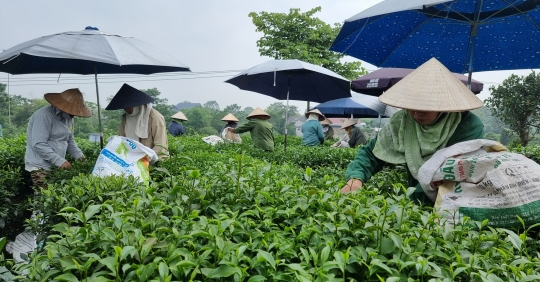[ad_1]
THAI NGUYEN Many tea cooperatives in Thai Nguyen have been converting to organic farming for many years, and the results are better than expected.
Pioneer in organic tea cultivation
Mr. Bui Trong Dai, Director of Tien Yen Tea and Community Tourism Cooperative (located in Thai Son 2 Hamlet, Tan Cuong Township, Thai Nguyen City) shared: He has taken over the family’s tea business since 2000.
Even then, he realized that the old form of farming, from spraying pesticides to fertilizing, is all chemical, rendering natural enemies like worms, crickets, spiders… incapable of living. Meanwhile, the land will be hardened, the water will be polluted, causing people’s health to be affected, many skin diseases to the point of serious and fatal diseases.
Since Mr. Dai and his family members and associated manufacturing households have been aware of the dangers of chemical proliferation for many generations, they think day and night about changing production methods that are safe for people and friendly to the environment.
This is also the reason why Tien Yen Tea Cooperative started cultivating organic tea very early before 2010 when very few people were producing this form in Thai Nguyen. To date, this unit has more than 10 hectares of tea growing area, all of which have been VietGAP certified and are in the process of acknowledging the process as organic tea products.
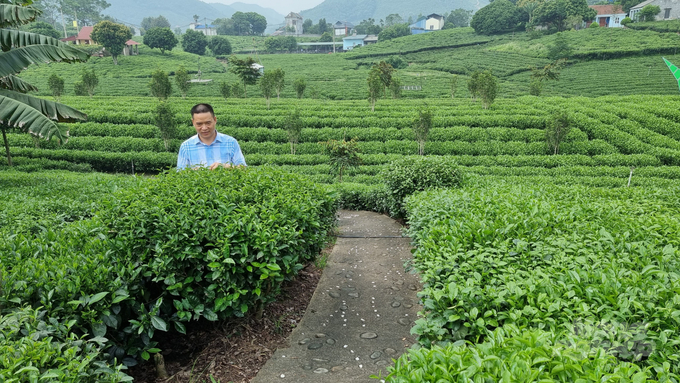
Mr. Bui Trong Dai, Director of Tien Yen Tea and Community Tourism Cooperative, has been making tea organically since before 2010. Photo: Math Nguyen.
Dai said excitedly, “Our people live in the middle of Tan Cuong tea district, thanks to the early organic tea production, the environment in this area is fresh, there is no longer the unpleasant smell of chemical pesticides flying everywhere. The water source is now basically clean and safe, and the well water is still the source of people’s daily life and nutrition. Neighborhood people have long been free of cancer or similar deadly diseases, environmental pollution and water pollution.
Many people in the hamlet of Thai Son 2 have devoted their lives to cultivating and harvesting tea, and they are the ones most convinced of the benefits of organic tea growing.”
Ms. Loan, who will turn almost 60 this year and has spent her whole life with tea, said: In the past, the use of chemical fertilizers, especially chemical pesticides, has always brought people discomfort, itching, fatigue, and even environmental problems with the tea hills in be in contact or live nearby. But in recent years, when we stop using chemicals and switch to organic, people’s health is better and more active. Now everyone is excitedly making tea, with peace of mind in production without worrying more about toxicity.
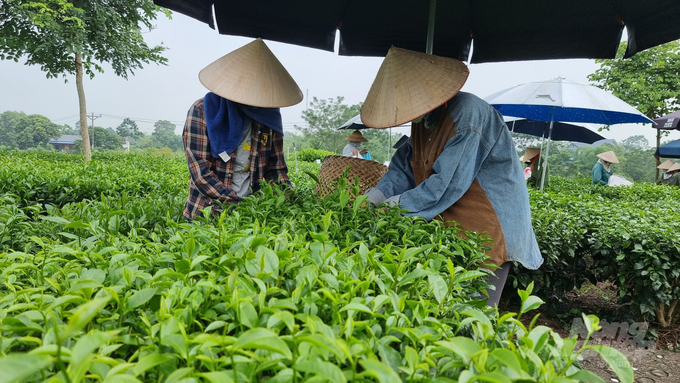
Employees feel safe at work without worrying about the toxicity of pesticides and chemical fertilizers. Picture: Dao Thanh.
Stick to organic
Mr. Nguyen Thanh Duong, Director of Tan Cuong Midland Tea Cooperative (Thai Nguyen City) said: Since 2017, 100% of the cooperative’s tea-growing area has been converted to organic farming. The initial period of implementation was extremely difficult as it took around 6 months for the yield to drop sharply due to the lack of quality tea.
Another problem that deters farmers is the high density of pests and diseases. The above problems cause tea farmers to lose income, even not harvest, many cooperative members are discouraged and want to return to the old cultivation method.
However, the head of the Tan Cuong Midland Tea Cooperative encouraged people to persevere, as organic products such as bean pods, tree bark, sawdust, green manure, manure, wild peanuts, rice straw, etc. take time to decompose and improve the soil. People no longer use toxic chemical pesticides, instead they use organic products derived from herbs. After a while, useful natural enemies will develop and the pests will be eliminated.
After about 6 months, when tea plants start absorbing nutrients from organic produce, tea production begins to recover. After more than 1 year, the amount of nutrients in the soil is kept stable, the effect is obvious, the performance is the same as using artificial fertilizer, but the quality is absolutely harmless. The bark, bean pods and sawdust form a thick layer of humus to keep the plants moist and natural nutrients are absorbed into the soil to help the tea sprouts grow better and fatter.
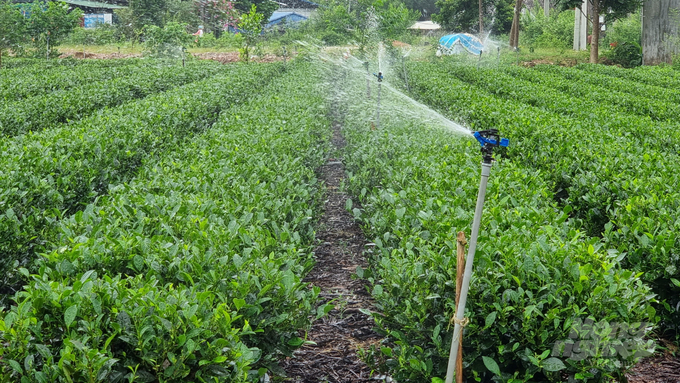
In order for the tea trees in the tea garden of the Tan Cuong Midland Tea Cooperative to grow well, the soil is covered with bark humus. Picture: Math Nguyen.
Mr. Nguyen Thanh Duong enthusiastically said, “After more than 5 years of implementing organic tea cultivation, the results are clear and bring many benefits to growers. The cost of care has been significantly reduced compared to using the traditional method. Fertilizers and chemical pesticides The soil is no longer hardened, but has become porous, can be cultivated well, and saves water for irrigation because the plants are kept moist by the thick layer of humus. Of course, the quality of the product has been greatly improved, and the users can use it with peace of mind.”
Increase income from tourism use
With today’s demanding market demand, it is not enough to have a good tea taste, but to ensure that there are no residues of pesticides and toxic chemicals. Because of this, many areas in Thai Nguyen have gradually switched to organic tea production, organic standards. In which some prominent places like Tan Cuong, Phuc Xuan and Phuc Triu (in Thai Nguyen town) communes have been implemented; La Bang (Dai Tu district) and some places in Dong Hy and Phu Luong districts.
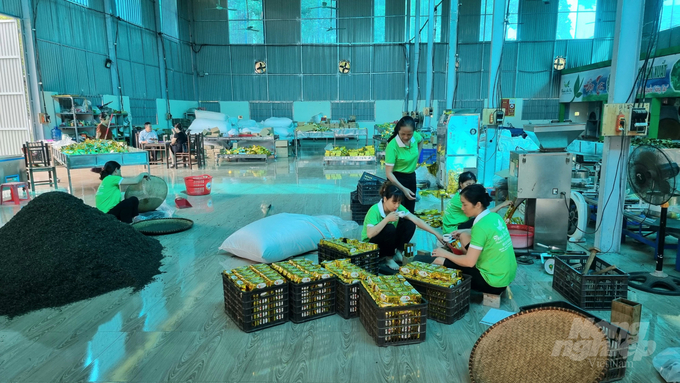
In the packaging workshop of the La Bang Tea Cooperative. Picture: Dao Thanh.
Ms. Nguyen Thi Hai, Director of La Bang Tea Cooperative (Dai Tu District) said: In order for tea products to confirm customers’ trust and reach the market, it is necessary to carry out the minimum cultivation and nurturing process that conforms to VietGAP standards. Organic farming in particular is superior as it both reduces pollution and ensures the health of producers and consumers.
The La Bang Tea Cooperative has only grown organically since 2019 but has clearly seen the positive results it brings. Currently, the cooperative has 15 member households and more than 100 associated households covering a total area of more than 30 hectares. On average, each household produces tea from 8 Sao – 1 acre, receives 8 batches of tea per year, each tea stick brings income more than 20 million VND/year. According to La Bang Tea Cooperative, some households have an income of up to VND 350 million/year from growing tea, and the average household is around VND 150-200 million/year.
Not only are the products safe for consumers, but organic tea products have a higher selling price than the current market average. The cheapest variant also costs from 150,000 VND/kg, the expensive variant costs over 3,000,000 VND/kg. Meanwhile, lower production costs are also helping tea farmers’ incomes increase.
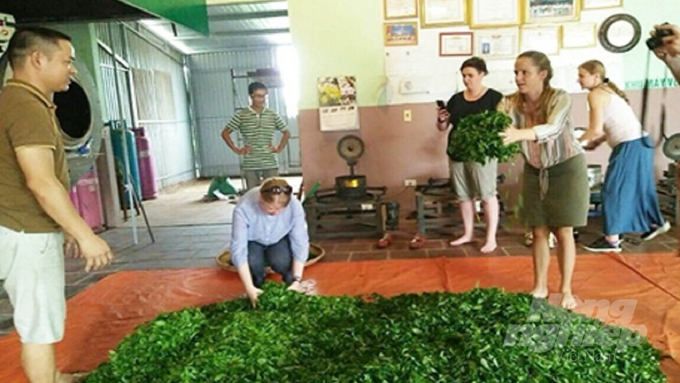
Foreign tourists are interested in witnessing the process of making tea products at Tien Yen Tea and Community Tourism Cooperative. Picture: Math Nguyen.
In addition, organically produced tea areas have also become tourist attractions. Since then, more catering and accommodation services are offered, products are promoted and sold to visitors. This job brings double profits for the current organic tea production units.
In Tan Cuong Township (Thai town of Nguyen), until now, a number of tea production plants have built facilities to welcome tourists to visit and experience. Leading this trend, the Tien Yen Tea Cooperative and Community Tourism are always ready to welcome visitors to experience tea gathering and processing.
Another place is La Bang commune (Dai Tu district), in these summer days this locality welcomes thousands of tourists every day. People are interested because they come here and immerse themselves in the beautiful scenery of mountains, forests, rivers and streams that nature bestows on the eastern slopes of Tam Dao Mountains; People are drawn to the green tea hills, experiences from tea harvesting, processing into finished products with farmers.
3. Multiplier Benefit:
– The living environment is improved, the health of producers and consumers is secured.
– Reduce maintenance costs, save water for irrigation, especially in high hills.
– The economic value is increased, accepted and trusted by difficult customers.
Profit multiplied by 2:
– Product price is higher than normal product.
– Tea makers increase income from tourist experiences, service money and product sales.
[ad_2]
Source link

